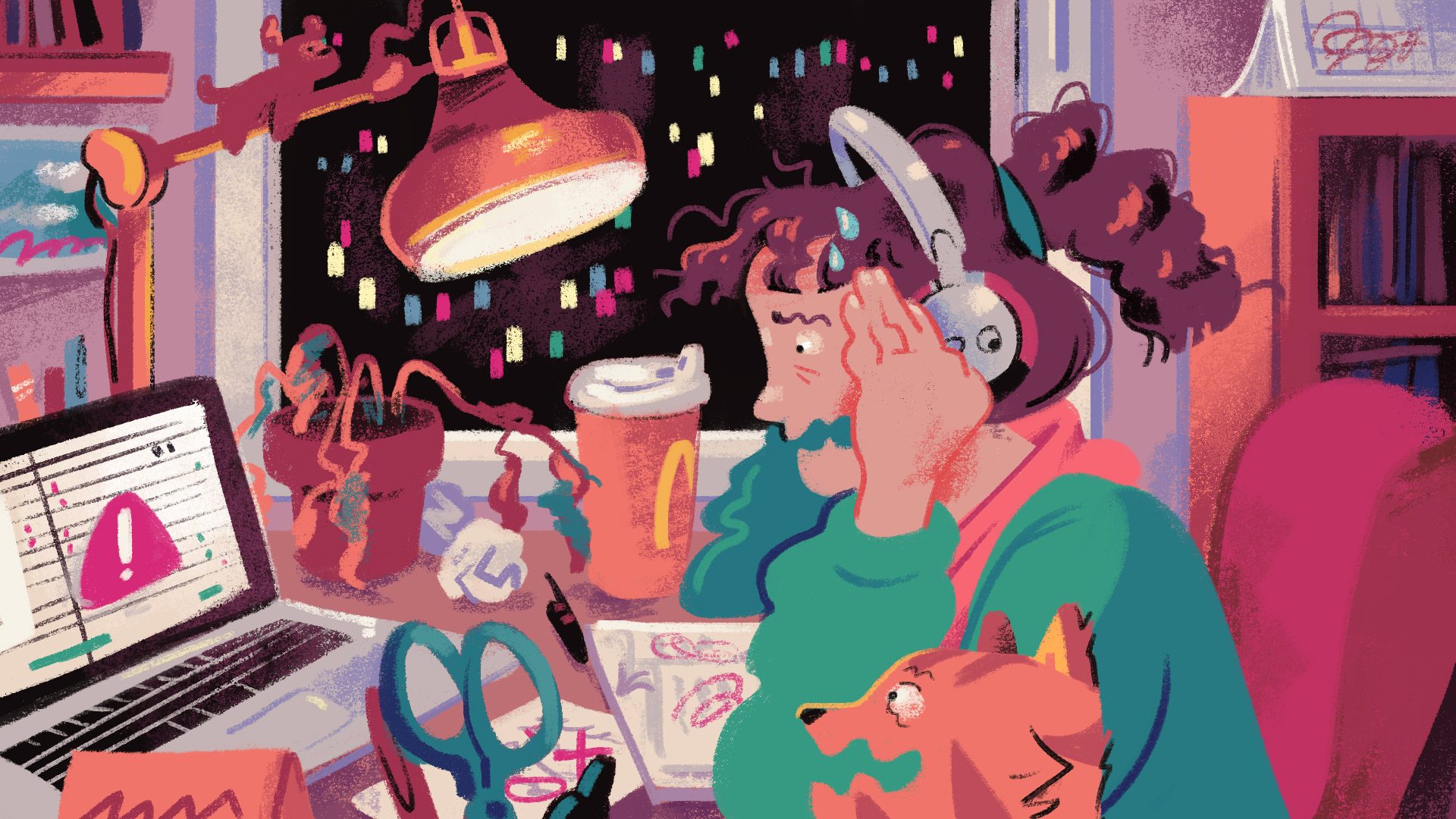SUMMARY
This is AI generated summarization, which may have errors. For context, always refer to the full article.

This story was made in collaboration with data consultancy TheNerve.
MANILA, Philippines – “I have a feeling it was way easier to be alive before,” said Elaine, a young Filipina worker who recently became financially independent.
Elaine (not her real name) lives alone in a condominium in one of the most expensive cities in Metro Manila. She said her rent is “skyrocket high,” but that she’d rather live close to her workplace than live further away and spend more money on regular commutes.
She currently works in a creative position on the Philippine team for an Australian company – her first full-time job after doing mostly freelance work since graduating. She said her current salary is already above the average local salary, but that she still doesn’t feel like she’s being paid enough.
“I pay my rent, then I do my groceries, then I’m left with so little…. Everything is so expensive,” Elaine said.
Another young worker, Leimar, lives with his family in the province, so he doesn’t have to worry about rent in the country’s capital the way Elaine does. But Leimar is the eldest among his siblings, and his younger sister’s high school tuition is the largest among his regular expenses.
“I fund my younger sister’s studies. Right after graduation, I was the one who funded her tuition and gave her allowance. My expenses are really more about my family. And the rest of my expenses are for whenever I go out, when I go to Manila, and when I attend meetings,” he explained in a mix of English and Filipino.
Leimar works as an occupational therapist and is currently a consultant for two private clinics in Bataan. He’s satisfied with his current salary and work setup for the time being, but he acknowledged that it isn’t sustainable for anyone who plans to get married or start a family anytime soon.
Elaine and Leimar have a lot in common – they value having a work-life balance, and they have big dreams for themselves. They are also both 26 years old, making them among the oldest of Gen Z Filipinos.
Gen Z – born between 1997 and 2012 – have been making waves for challenging norms and long-standing schools of thought about work, money, and the future. But these protests don’t happen in a vacuum, and Filipinos from all generations can learn a thing or two about how the current socioeconomic situation impacts their everyday lives.
Financial stability? In this economy?
Rappler surveyed a total of 537 Gen Z Filipinos, aged 15 to 26, about their attitudes towards work, as well as their spending and saving habits. Across income classes, Gen Z Filipinos have a negative view of the current state of the Philippine economy. This is especially pronounced among middle class Gen Zs, but even upper-income Gen Zs believe the country’s economy is weak.
Rising inflation also remains a top concern for Filipinos. Pulse Asia survey findings showed that the majority of Filipinos are dissatisfied with the Marcos government’s efforts to control inflation, which also happened with the Duterte government amid high inflation rates in the second half of 2018.
In recent years, a significant event that triggered drastic spikes in inflation was the Russian invasion of Ukraine in February 2022, which sent global oil prices soaring.
Inflation rates also have a direct impact on wages in the country. Sonny Africa, executive director of IBON Foundation, said the real value of the minimum wage “has basically been flat” since the early 2000s, “with slight monthly variations depending on inflation rates and the occasional wage hikes.”
Even Metro Manila, which has the highest wages in the country, has only seen minor increases in real minimum wage rates. Wage rates in other regions in the country fall far behind the rates in the national capital. ([OPINION] Minimum wages have been historically stagnant – it’s time to act)
“All the hyped economic growth and supposed development of the Philippine economy over nearly 35 years has only increased the real wage in NCR by a piddling 1.8% – or virtually no change at all in the status of a minimum wage worker,” Africa said in an interview with Rappler.
The plight of young workers today
IBON Foundation also said the millions-surge in part-time and unpaid family workers highlighted the Marcos administration’s inability to generate meaningful jobs. Rappler’s survey findings also showed that Gen Z workers need several jobs or sources of income just to feel financially secure.
For Africa, the magnitude of wage hikes matters more than the frequency. “It is okay to have relatively infrequent wage hikes if the minimum wage and wages received are just and fair to begin with and allow a decent standard of living for workers,” he said.
He added that wage hikes can be made when inflation “erodes” the real value of wages, so that workers can maintain their standards of living, or when productivity and profits increase.
“What the wage workers receive is a central element for their well-being and of their families,” Africa said.
Apart from giving workers better wages, Africa said the government should ensure that all workers get their statutory benefits and have decent working conditions. When Gen Z workers surveyed by Rappler were asked to rank the three most important factors when choosing a job, salary and benefits topped the list, with 3 in 4 Gen Z workers placing them among their Top 3 priorities.
Apart from livable wages and benefits, Africa said all working Filipinos should also have “access to quality publicly-provided education, health, housing and social protection.”
Elaine is very grateful for the various benefits her company provides, which include the standard healthcare benefits, vacation leaves, and sick leaves. She also said her company provides menstrual leaves and mental health leaves, which she appreciates.
But she acknowledged that these aren’t sufficient. For instance, health benefits only cover consultation fees, and Elaine still has to use her own money for medicine and procedures. She also sees a therapist and psychiatrist, and she emphasized that she needs to be mentally healthy to get through each day.
“There’s so many things to spend [on] for my wellness [to be on] an okay level for me to even function for work,” she said.
On the other hand, Leimar does not receive any benefits, as he works for private clinics. He shared that he pays for his own insurance without any financial support from his employers – which he found difficult during the pandemic, as he did not receive a regular salary when lockdowns put in-person work on hold.
“Instead of having all your salary to yourself, you’ll have to set aside a part of it to pay for your insurance. Your salary will really be depleted. It’s a good thing I had savings set aside, so I got to pay for my insurance during the pandemic. But imagine if you don’t have any savings at all, and you still need to pay for insurance,” Leimar said.
Similarly, the majority of Gen Z workers are afraid of running into unforeseeable emergencies that would deplete their savings. This is especially true for low- and middle-income earners. (READ: Worried Filipinos open up after viral tweet on health emergencies)
Leimar estimated that he has an emergency fund big enough to cover six months of expenses, but Elaine, who no longer relies on anyone else for money, estimated that her emergency fund is only good enough for one month.
“If I had to spend [on] anything extra, say, my blinds broke, it’s not instant that I could just have it fixed…. I just have to live a sort of restricted life,” she said.
‘I don’t dream of labor anymore’
This is what Elaine said when asked if she would return to pursuing her creative passions if she becomes more financially stable in the future. “I’d probably go with [that] Gen Z stereotype,” she said, laughing.
“I don’t think I have a dream job now. I think I just have a dream lifestyle where I want to be comfortable with everything that I have. I just want to be able to provide for myself and my future cats and dogs,” Elaine added.
Leimar was less familiar with Gen Z stereotypes, but he also said work wasn’t his number one priority in life. “Let’s say [work is] number two [among my priorities], because you need a social life, of course. Because you’re working to invest in the future, really,” he said.
Among Gen Z Filipinos, there are more workers who do not see work as their top priority in life compared to those who do.
But it would be inaccurate to say Gen Z workers have stopped caring about their careers altogether. Elaine is very passionate about her craft, but like most creatives, she had to choose between pursuing her passion full-time and going for a more practical, sustainable career. She also shared that as soon as she finished college, she prioritized moving out and living on her own.
“After college, I still tried to go for the passion route, but if I wanted to go through the passion route, I had to intern. And in the creative industry, interns don’t get paid at all. I also didn’t really have the best family life, so I didn’t want to live at home and experience all of that. I think my priority was really to move out right after college,” she said.
Leimar, being a healthcare professional, said that despite how tiring his job is, he enjoys the work he does because he gets to interact and foster good relationships with his patients and their families.
“Usually, we don’t interact with just the patient. Either you interact with their parents, or if they’re adult patients, then their children, something like that. You’ll somewhat get attached to them, too. You’ll learn more about their family, their dynamics, because you need to know that to integrate your treatment approach,” he said.
Africa also linked the scarcity of domestic jobs to the millions of Filipinos who have sought work abroad. Currently, about one in five Filipinos aspires to live abroad, and those who want to work abroad are mostly eyeing job opportunities in Canada, Saudi Arabia, Kuwait, and the United Arab Emirates.
Leimar said he plans to work abroad down the line because of the government benefits, particularly pension, given to healthcare workers in other countries.
“I plan to eventually work in other countries, [because of] how good their governments are. You’ll work and get tired…but at the end of the day, when you get older, you’ll be receiving a monthly pension,” he said.
Elaine has many misgivings about living in Manila, too. She’s a biker and commuter, and she grumbled about the country’s poor urban planning. She also doesn’t know if it’s possible for workers in the Philippines to partake of a completely ethical job while being able to live comfortably. But it’s the community of fellow creatives as well as her friends and loved ones that keep her from wanting to leave her life in Manila behind.
“I have a lot of hope for this country, but I just don’t know where to put it,” she said.
Generations in the Philippine context
But such generational stereotypes may not necessarily apply to all Filipinos. Sociologist and Rappler columnist Jayeel Cornelio, who researches on the Filipino youth, argued that generational categories like Gen Z, millennials, and baby boomers are “arguably inappropriate” in the Philippine context, as these are “directly imported from Western societies.”
Cornelio said such stereotypes only refer to a “very small segment” of the Filipino youth, which are the highly-educated and affluent.
“The culture is defined by the privileged about the privileged,” Cornelio wrote in a column from 2020.
When respondents were segmented by income classes, the percentage of upper-income Gen Z workers who included salary and benefits among their top 3 factors for a job was significantly lower than those from low- and middle-income classes. Only about one in two upper-income Gen Z workers included salary and benefits among their top 3 factors, compared to over four in five middle-income earners, and seven in 10 low-income earners.
Upper-income Gen Z Filipinos could also afford to prioritize more intangible benefits when looking for jobs. For upper-income Gen Z Filipinos, having their personal values align with company culture ranked fifth among 10 given factors when choosing a job. This factor ranked seventh for middle-income earners, and was tied for last place for low-income earners.
Today’s socioeconomic conditions don’t exclusively affect Gen Z workers, either. “Different generations of Filipinos have always struggled to make ends meet because the Philippine economy has been underdeveloped for so long,” he said.
Africa acknowledged, however, that domestic conditions are “overall much worse today” and attributed these to four decades of “reckless globalization.”
“Educated and well-connected Gen Z workers may be lucky enough to be among those few able to land reasonably stable and relatively high-paying jobs. The general situation, however, is bleak with nearly 21 million families or 75% of families rating themselves as poor or borderline poor according to SWS, and 18.2 million households, or nearly 70% of households, not having any savings according to the [Bangko Sentral ng Pilipinas],” Africa said. – with reports from Patrisha Estrada, Keith Yadao, and Sean dela Cruz/Rappler.com
This study was made in collaboration with TheNerve, a Manila-based consultancy that specializes in analyzing data to bring forth powerful insights and narratives. Believing that data can deliver real-world impact, the company enables its partners across a wide range of industries to cut through the clutter and extract value and meaning from various datasets. The insights guide partners’ business decisions and help them engage with their communities better. Composed of a team of data scientists, business strategists, award-winning storytellers, and designers, the company is on a mission to transform data science into data relevance.
Add a comment
How does this make you feel?


![[ANALYSIS] How are generations formed?](https://www.rappler.com/tachyon/2020/12/generations.jpg?fit=449%2C449)
![[OPINION] Unpaid care work by women is a public concern](https://www.rappler.com/tachyon/2024/07/20240725-unpaid-care-work-public-concern.jpg?resize=257%2C257&crop_strategy=attention)




There are no comments yet. Add your comment to start the conversation.